
Along Italian Coast, a Climate-Conscious Program Turns “Rubbish Into Music”
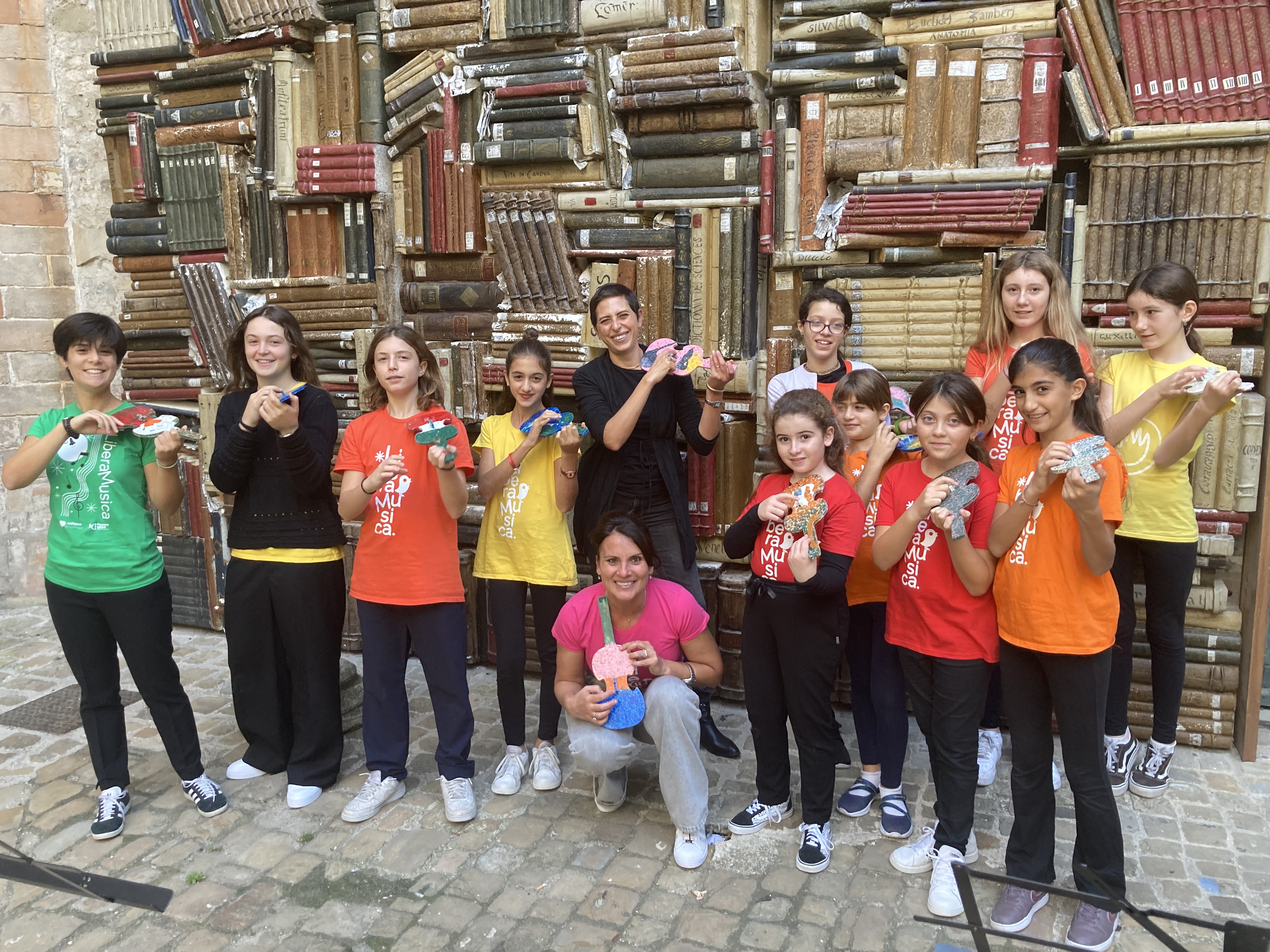
Students displaying their violins made from recycled materials. Photo: LiberaMusica.
In the city where LiberaMusica operates—Pesaro, Italy, right on the Mediterranean coast—the connection with nature is strong and part of everyday life. From the Apennine Mountains to the coastline, children grow up surrounded by an environment that is rich, fragile, and, today more than ever, in need of protection. In recent years, our region has been marked by extreme events: floods, droughts, and changing seasons are reshaping our landscape. Schools and associations have been working hard to raise ecological awareness, and LiberaMusica wanted to contribute by doing what we know best: making music.
That’s when we discovered Pequenas Huellas, a small Italian association that was experimenting with making violins from recycled plastic. This felt like the missing piece of our puzzle. Together, we designed a project in which children could literally turn the rubbish into music.
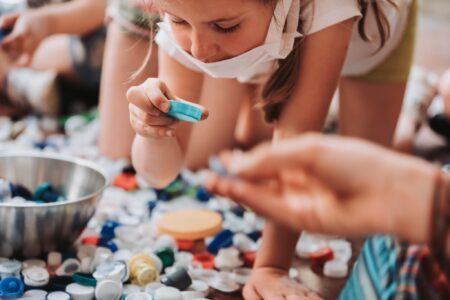
We started small, working in tandem with a center for children with disabilities and an organization called Riù, our local creative reuse hub. The first step was to collect plastic—bottle caps, detergent bottles, and so on—anything made of colourful HDPE (high-density polyethylene). The children threw themselves into the project with enthusiasm, turning it into a game: who could find the most beautiful or unusual piece? The children at the disability center also joined in, helping to sort and prepare the materials.
Then came the best part: Transformation Week!
Mornings were for school visits: our facilitators visited schools to explain the importance of recycling and to raise awareness among students about the impact that waste and overconsumption are having on nature. In the afternoons, children went to the Reuse Center, where machines were available to shred plastic and mold the violins. Each participant could design their instrument freely—flowers, words, animals, lightning bolts—enjoying full creative license to express themselves.
The result, in each case? A plastic violin—not a full-size instrument, but a preparatory one inspired by the Suzuki Method. Although it has a bridge, it has no strings and isn’t intended for playing tunes; rather, its purpose is to introduce children to the orchestra through play.
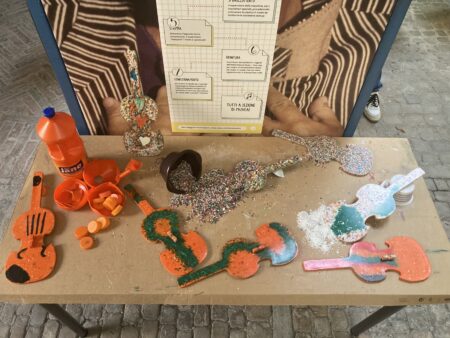
Why can some four-year-olds say “tyrannosaurus” but not “double bass?” Because, in their daily lives, they see little about musical instruments, but lots of images of fantastic dinosaurs! These violins serve as musical toys that help children think about music, recognize it in their lives, and begin technical learning (violin position, bow position, rhythm, and bowings).
The project ended with a community celebration. Families and community members came together to see the children present the different phases of their work: how they collected and sorted plastic, how it needed to be washed and dried, and how they designed and built their violins. A group of older violin students from the secondary school performed for the younger children, showing them the sound of a real violin and a real string orchestra.
And then came the most moving moment of the day, when children donated their plastic violins to the younger kindergarten students. With the guidance of specialized teachers, the new instruments allowed these kindergarteners to take their first steps into the world of music through play together: imitating the orchestra, experimenting with the role of conductor, and experiencing music as a collective and inclusive activity.
Ultimately, our project’s strength went further than the formation of musical pathways. It included seeing everyone—children, parents, teachers, and participants from the disability center—come together to create and celebrate. Even people with no prior connection to LiberaMusica joined in, sharing stories and cheering on the young creators while enjoying the music. We had been afraid we wouldn’t get enough bottle caps; instead, we ended up with bags and bags of them, thanks to many families with no connection to our work. The overwhelming community response led us to set aside a corner of our rehearsal space for bottle cap collection!
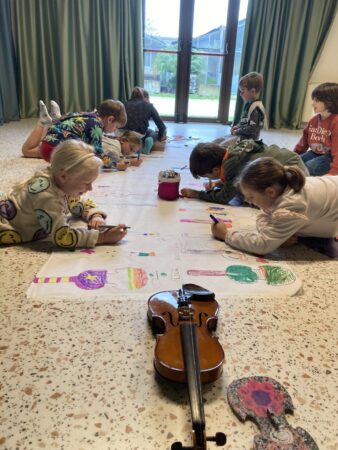
After three years of experimentation in Pesaro, we decided to embark on a three-year journey that brought the project to small villages in the hinterland. Embracing the unique characteristics of the region is fundamental for us, and we do not want families living far from urban centers—whether by choice or by necessity—to be disadvantaged or deprived of the same educational opportunities as those in the city.
During the final week of October, we began the project in Urbino, working with 100 students from the local school. In the following years, we plan to expand to other small towns in the hinterland, progressively widening our impact. It’s likely that, in the future, more families will move to inland areas: during the COVID-19 pandemic, there was already a significant increase in this trend. Those who move inland out of necessity—often due to lower housing costs—deserve equal access to educational opportunities; those who choose to move there should also be supported and encouraged.
This project has taught us that music and care for nature are not separate: by caring for nature, we can also create music. Art and nature can grow together, creating a space where creativity, connection, and hope can germinate and flourish.
Perhaps, as Italian conductor Claudio Abbado once said, that is exactly what we need: “More music and more trees.”
Related Content
All Regions, Community Building, Editorials, Gather Together, Opinion, Perspectives & Collective Action, Professional Development, Program Design, Student Voice & Leadership, Teaching & Learning, the ensemble
EDITORIAL
Musical Benchmarks Build Equity
Patrick Scafidi
All Regions, Collaborations, Community Building, Events/Performances, Gather Together, News and Resources, North America, Professional Development
New ESUSA Opportunities & Events
Patrick Scafidi
Collaborations, Community Building, Europe, Events/Performances, Funding & Support, Gather Together, Middle East, News and Resources, Professional Development
Funding Opportunity for Arab Artists Based in Europe
Patrick Scafidi
Collaborations, Community Building, Featured, Gather Together, New Orleans, North America, Perspectives & Collective Action, Student Voice & Leadership
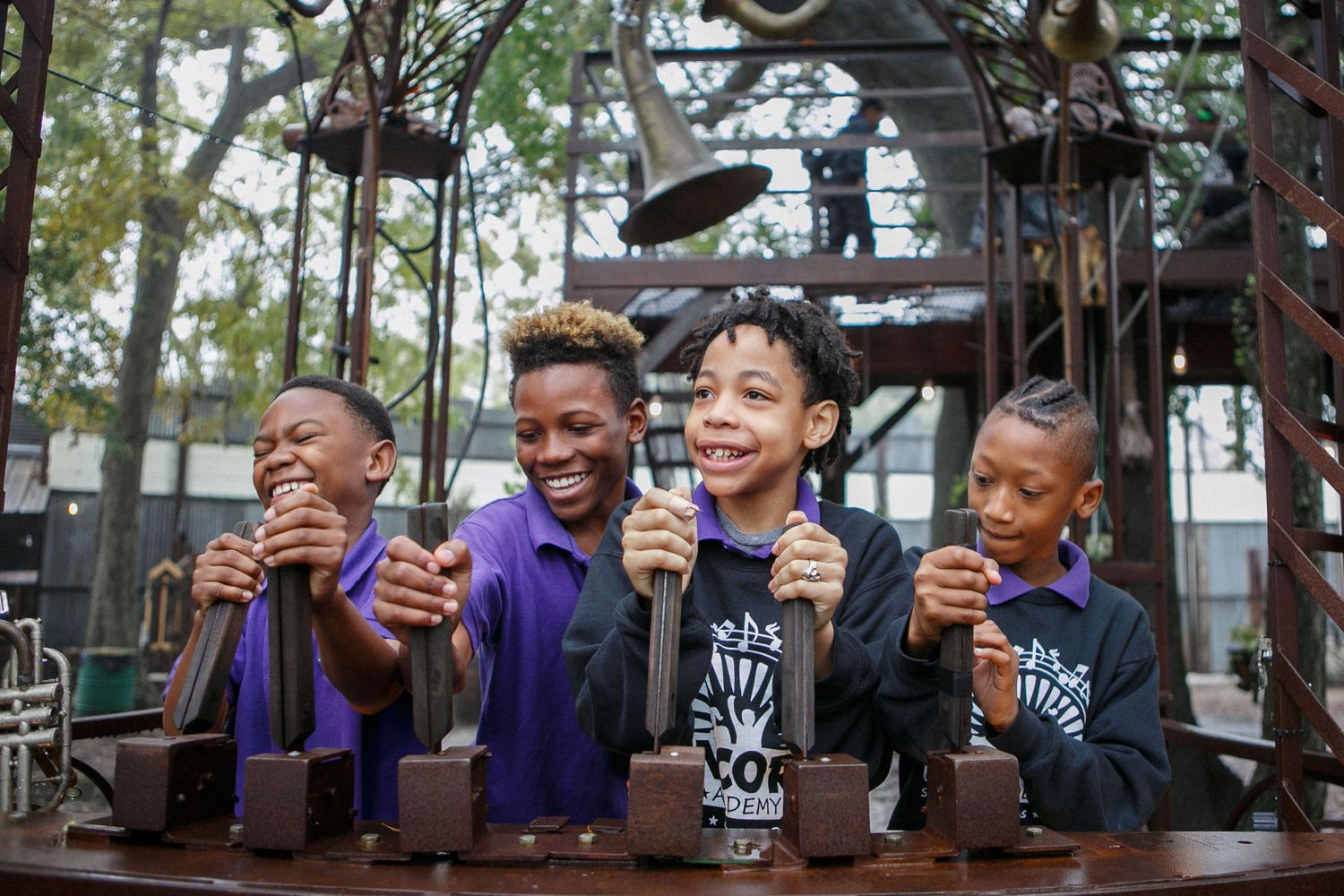
The Importance of Free Play in Music Education
Patrick Scafidi


